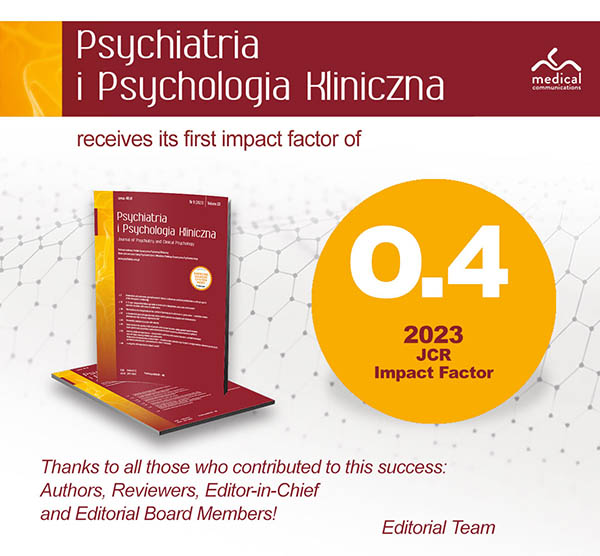Cognitive functions and autoantibodies in patients with systemic lupus erythematosus
Anna Bogaczewicz1, Jakub Ząbek2, Tomasz Sobów1, Ewa Robak3, Jarosław Bogaczewicz3, Anna Woźniacka3
 Affiliacja i adres do korespondencji
Affiliacja i adres do korespondencjiIntroduction: Autoantibodies may occur in the course of various diseases. In the case of systemic lupus erythematosus the presence of specific autoantibodies is included in the classification criteria of the disease. The aim of the study was to investigate whether the presence of the serologic markers of systemic lupus erythematosus, i.e. anti-dsDNA, anti-Sm and anticardiolipin antibodies of the class IgM and IgG are linked with the results of neuropsychological tests evaluating selected cognitive functions in patients without overt neuropsychiatric lupus and without antiphospholipid syndrome. Material and methods: The study included 22 patients with systemic lupus erythematosus. For the assessment of anti-dsDNA, anti-Sm and anticardiolipin antibodies the immunoenzymatic method was used. For neuropsychological estimation of the selected cognitive functions the attention switching test and the choice reaction time were applied, in which the results are expressed as the average delay i.e. mean correct latency, using the computer-based Cambridge Neuropsychological Test Automated Battery (CANTAB). Results: The results of attention switching test in patients with anti-Sm antibodies were lower, but not significantly different from those obtained by the patients without such antibodies: 75.0 (73.12–88.12) vs. 92.5 (85–95). Choice reaction time was significantly longer in patients with anti-Sm antibodies in comparison to the patients without anti- Sm antibodies: 614.9 (520.6–740.8) vs. 476.7 (396.6–540) (p = 0.01). No significant difference was demonstrated in the results of attention switching test and choice reaction time with regard to the presence of anti-dsDNA antibodies. The results of attention switching test and choice reaction time were not different between the groups of patients with and without anticardiolipin antibodies in the IgM and IgG class. Conclusions: Anti-Sm antibodies seem to contribute to the pathogenetic pathway involved in the deterioration of the results of the selected cognitive functions in systemic lupus erythematosus patients. The use of neuropsychological assessment as a screening procedure in systemic lupus erythematosus patients with anti-Sm antibodies appears to be reasonable.















